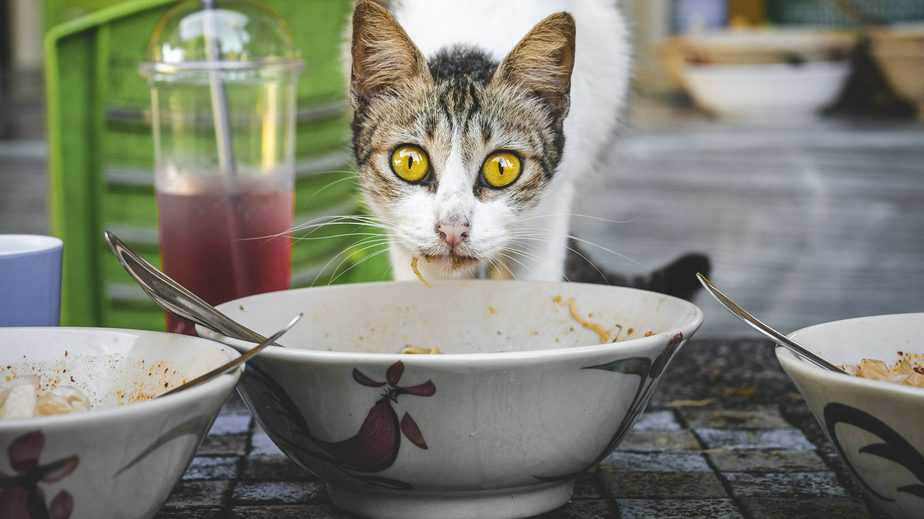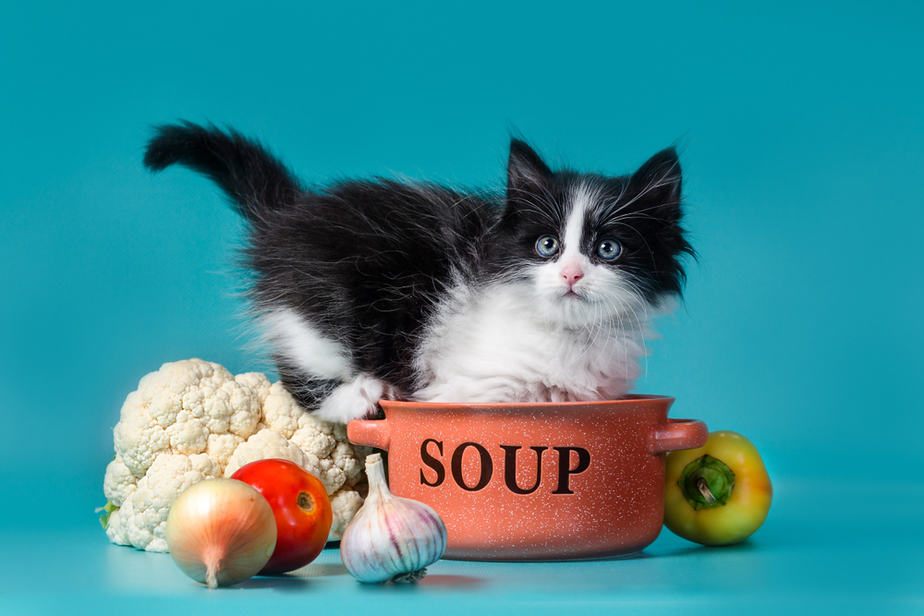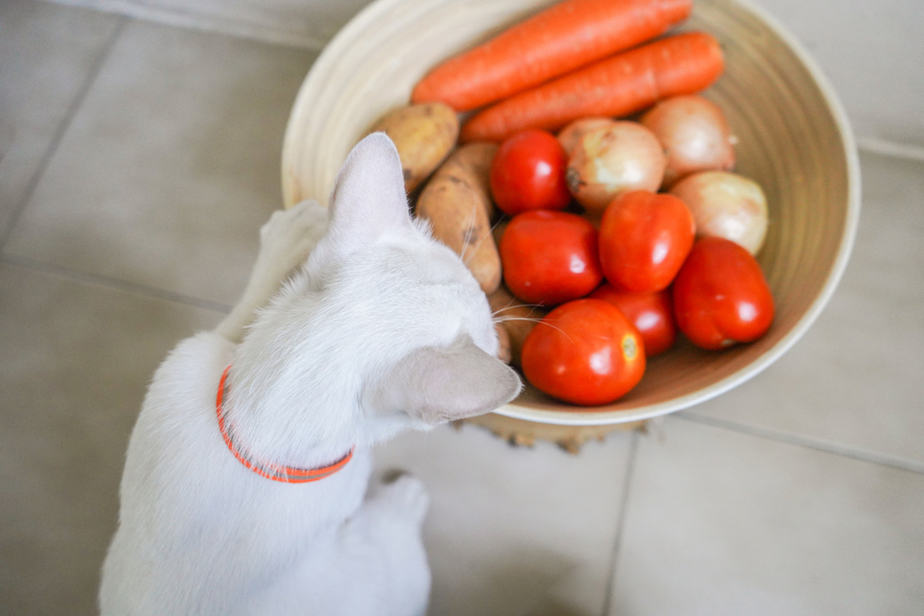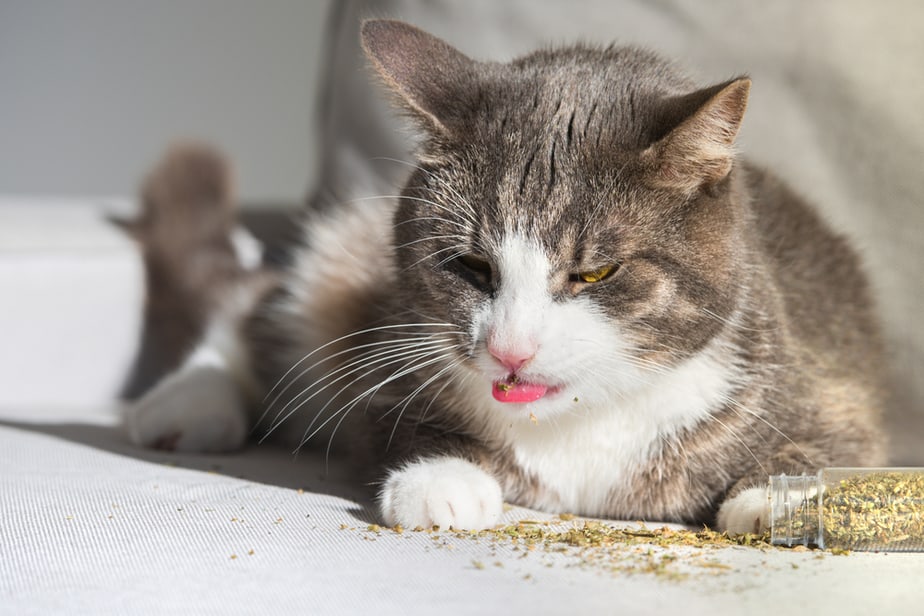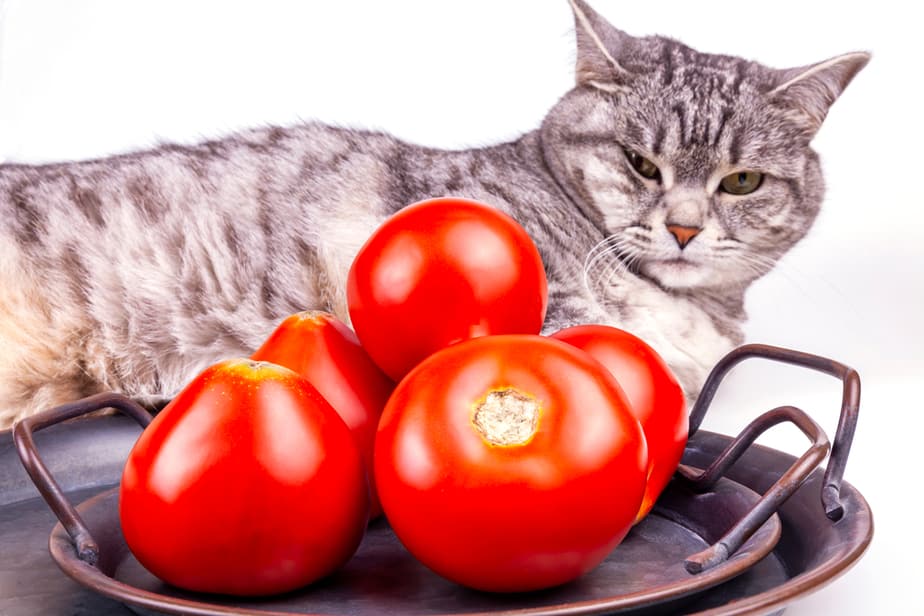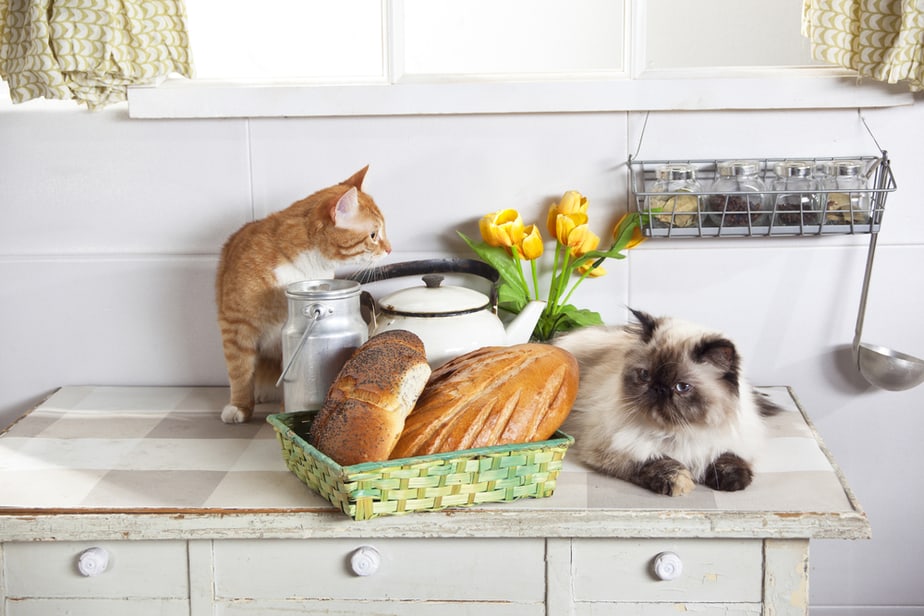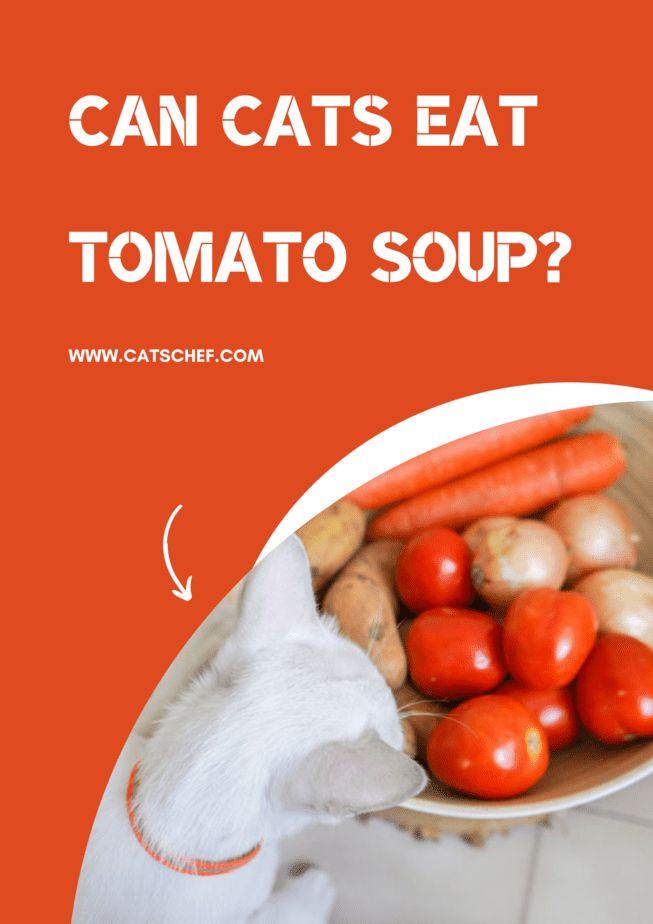📖 Table of Content:
Cats are like tiny furry vacuums that suck in everything on their path. You’re slightly ashamed to admit it, but your cat will eat pretty much anything within his reach. You didn’t even know he liked tomatoes! Now you’re left wondering, can cats eat tomato soup?
If you’re anything like me, you’ve probably checked the ingredients list on your feline friend’s cat food out of curiosity. Tomatoes are a common ingredient, so you just assumed they aren’t toxic to cats. And you were right – well, kind of.
Tomatoes are pretty harmless to cats if eaten ripe and in moderation. If your trusty sidekick is a big fan of this spherical fruit/vegetable (the debate is ongoing), you have nothing to worry about. Tomato soup, on the other hand, might be a dangerous delicacy.
So, if you’re wondering whether your furry friend can eat tomato soup, you might want to consider several things.
Are the tomatoes ripe or unripe? Is the soup canned or homemade? Does it contain any harmful ingredients like onions and garlic?
Can cats eat tomato soup?
Unless your cat is in love with tomatoes, you should probably avoid feeding him tomato soup. You might think tomatoes are completely harmless since they are a common ingredient in cat food, but you’re wrong.
While ripe tomatoes are completely safe for your cat to consume, unripe tomatoes and tomato plants are extremely toxic because they contain solanine. Your cat can get seriously sick from nibbling on the green parts of the tomato. Make sure to keep all your produce out of your feline friend’s reach!
Another thing to keep in mind is whether your tomato soup is homemade or canned. Homemade tomato soup might get a passing grade – if you make sure to prepare it the right way. Use ripe tomatoes, don’t add any seasoning or herbs, and only include cat-safe veggies (like carrots, pumpkin, or okra).
Unfortunately, canned tomato soups can contain a number of harmful ingredients. They might be easier to prepare, but if your fluffy monster loves stealing food, it’s better to keep it homemade. You can even choose to share it willingly!
What ingredients are found in tomato soup?
“Tomato soup is packed with delicious veggies and flavourful heavy cream – I have to share it with my floof! Cats can eat tomato soup, right?”
Wrong – tomato soup often includes herbs and veggies that could send your cat running to the litter box, or even worse!
When it comes to cat-safe tomato soup, your grandma’s secret recipe can stay hidden. If you’re wondering which soup ingredients are okay and which you need to avoid, I’ve got you covered.
1. Tomatoes
Go figure that if you want to make tomato soup, you’ll need some tomatoes. Unfortunately, not all tomatoes are safe for your cat to consume. Although you don’t have to worry if your feline friend takes a little lick of your tomato soup, you still want to make sure you’re using the best and safest ingredients.
Unripe tomatoes belong somewhere safe in the cupboard waiting to ripen – and definitely way out of your curious kitty’s reach. Always be cautious with green tomatoes or slightly unripe tomatoes, as they contain higher solanine levels.
And if you’re a home gardener who loves to grow your own juicy tomatoes, be sure to not let your cat join in on the harvest. Any green parts of Solanaceae plants, of which tomato is one, are particularly toxic to felines (and humans, for that matter).
This includes the stems and leaves. If these parts are ingested, cats run the risk of developing stomach upset, nausea, lethargy, and slowed heart rate. If this is the case, you’ll need to take a speedy trip to the vet.
2. Onion and garlic
Onion and garlic are commonly used in tomato soup, both canned and homemade. You might not be able to imagine cooking anything without these two ingredients, but if you’re planning on inviting your guzzler to dinner, make sure to avoid them.
Onion and garlic are a part of the Allium family, which also includes chives, scallions, shallots, and leeks. All of them are harmful to cats. Your cat can experience serious digestive issues, poisoning, and dehydration from consuming onion and garlic in any form.
The good news is that you don’t have to get rid of onions and garlic completely. Your cat might be curious about what you’re cooking, but he won’t be drawn to the smell of onion and garlic. As long as you avoid feeding them to your cat yourself, you don’t have to worry too much!
3. Salt
It’s no secret too much salt is bad for us humans, but is it good for your cat? The answer should be pretty obvious – your cat shouldn’t consume too much salt. And newsflash – tomato soup does contain salt!
It’s important to mention that small amounts of salt won’t harm your pet. In fact, cats are notorious for not drinking enough water, which sometimes leads them to dehydration. If you add a tiny bit of salt to your cat’s meal, it may stimulate him to drink more water.
You have to be careful, though! Too much salt can lead to sodium poisoning, and cause a number of health issues. Canned tomato soup usually contains too much salt, making it even more undesirable in your cat’s diet.
If you decide to make some homemade chowder for your cat, it’s best to avoid salt and other seasonings altogether. Rather play it safe!
4. Herbs
If you’re a cat parent, you have to know your herbs! Some are alright for your four-legged friend to consume, but some can be extremely dangerous. You can’t control what goes into canned tomato soup, so make sure to check the ingredients list before purchasing.
A homemade dinner for two, starring you and your cat? No problem – just use basil, cilantro, rosemary, or thyme. They will add a wonderful aroma to your dish, and provide your kitty with some beneficial nutrients.
Avoid oregano, parsley, mint, or bay leaf as these are linked to serious digestive issues.
Cats don’t need herbs in their diets, and excessive amounts of any herb can cause them discomfort. If you want to include more herbs in your cat’s diet, it’s best to consult your vet beforehand.
5. Cream
Tomato soup is usually topped off with some cream and parmesan cheese. Absolutely delicious!
But your cat wouldn’t agree. Most cats are lactose intolerant, meaning they have trouble digesting cow’s milk and other dairy products.
There are some dairy-free alternatives on the market, but it’s best to skip them altogether. If you’re making the soup yourself, you can try blending a small potato to achieve that creamy texture (cats can be really picky when it comes to human food!)
Can cats eat other tomato-based foods?
Organic, cooked, ripe tomatoes are completely safe for your cat. As long as you don’t let your furball near the green parts, you have nothing to worry about! Tomato soup can be tricky because of harmful veggies and cream, but can cats eat other tomato-based foods?
Fresh tomato juice is safe for your cat, although he might not like it as much as you do. A cat can eat tomatoes only if they’re paired with other foods (veggie cat food, canned fish in tomato sauce, etc.) They don’t typically enjoy the taste of fresh tomatoes.
Tomato sauce is just as tricky as tomato soup. If it contains onion, garlic, seasoning, and herbs (which most brands do), it can be very dangerous for your cat to consume. If he loves eating fish in tomato sauce, make sure to only purchase canned fish specifically made for cats!
Ketchup and fries – a match made in heaven, right?! If your furball sneakily licks some ketchup off of your plate, there is a strong possibility he’ll be okay. Ketchup does contain some harmful ingredients, though, so make sure to not let your cat eat it frequently or in large amounts.
So, can cats eat other tomato-based foods? The answer is – probably not. While tomatoes themselves aren’t toxic to cats, some of the other ingredients found in these foods can be. My advice is to avoid feeding your cat anything you’re not sure about or to consult your vet.
What to do if your cat eats some tomato soup?
As we’ve previously established, tomato soup sucks for felines! It often contains so many harmful ingredients that you definitely don’t want it anywhere near your cat. But what if your trusty sidekick finds some leftover tomato soup on the kitchen counter?
Don’t panic. Your cat is likely to get sick after a few stolen licks of tomato soup, but it does depend on how much soup he manages to eat before you interfere. Look out for any signs of discomfort or digestive issues, but make sure to take your cat to the vet regardless of the amount of tomato soup he consumed.
Some of the most common symptoms of food poisoning in cats are vomiting, diarrhea, breathing difficulties, and lethargy. If your cat is experiencing milder symptoms, you might want to be on the lookout for pale gums, drooling, and loss of appetite.
Either way, if your cat eats any amount of tomato soup, don’t panic. Instead, contact your vet immediately. Your cat might have to stay at the vet’s until his symptoms subside, but as long as you react on time, he should be alright!
Final answer: Can cats eat tomato soup?
If your cat is anything like mine, he probably makes you have a mini heart attack on a daily basis. You never know what’s going on inside his head when he looks at an unidentified blob of food on the floor. So, can cats eat tomato soup safely?
The answer is no – unless you plan on making it yourself.
Ripe tomatoes are completely harmless, so if your furry friend loves tomato soup, you can just blend them and add some other cat-friendly veggies in the mix. It might not be the same tomato soup your grandma used to make, but at least it will be safe for your kitto!
Related post: Can Cats Eat Soup? How Much Can She Scoop Up?
